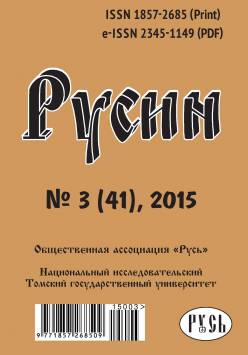Cognitive potential of rusin proverbs compared with those in the russian and ukrainian languages
The article analyses national and cultural connotations of proverbs in the Rusin language compared with the Russian and Ukrainian paremiology. Special attention is given to such ethnolinguistic markers as proper names (toponyms and anthrop-onyms), ethnonyms (names of the peoples and tribes) and the names of artifacts of the material culture (household items, clothes, etc.). Compared with cognate Slavic languages, Rusin paremiology and phraseology gives a lot of material about the interaction among the Slavic languages. Being on the border of Eastern and Western Slavic worlds, Rusins remain genetically committed to Eastern Slavia, yet they are open to cooperation with the West Slavic world. Identifying specifically national against the general allowed more objective and detailed description of the cognitive potential of both Rusin paremiology and its closely related Ukrainian and Russian paraemia.
Keywords
пословица, русинские пословицы, русские пословицы, украинские пословицы, proverbs, Rusin proverbs, Russian proverbs, Ukrainian proverbsAuthors
| Name | Organization | |
| Lomakina Olga | St. Tikhon's Orthodox University | rusoturisto07@mail.ru |
| Mokienko Valerij | Saint Petersburg State University | mokienko40@mail.ru |
References
_9_2016_1476371722.jpg)
Cognitive potential of rusin proverbs compared with those in the russian and ukrainian languages | Rusin. 2016. № 3 (45). DOI: 10.17223/18572685/45/9
